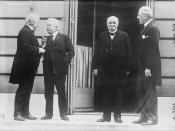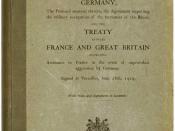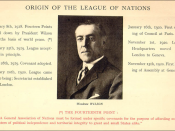The unconditional surrender of the German forces at the conclusion of World War I presented the United States and its European allies with the challenge of establishing peace in Europe. President Woodrow Wilson in January of 1918 presented his plans for peace in the Fourteen Points, the most important of which he considered Article X, which called for the League of Nations. However, at the Paris Peace Conference at Versailles the United States never signed the treaty or joined the League. It was not the power of the liberals and conservatives of America that led to the final defeat of the Treaty of Versailles, but rather the political ignorance, inability and inflexibility of the President.
President Woodrow Wilson's ideas for peace were well thought of, but in implementing his ideas, Wilson made irrevocable mistakes. In heading the delegation to the peace conference, Wilson made a serious mistake in not including representation of the legislative body of the United States , in not appointing Republicans to the commission.
As depicted in the Tribune's political cartoon, the United States was becoming involved in foreign matters without the support of the Senate. The Constitution of the United States calls for the Senate ratification of all treaties to end wars.
W.E.B. DuBois commented on the situation of the American schism and world peace in 1921, when the League of Nations met for the first time. He believed that the United States was not appropriately represented in peace conference. He believed that such a disgrace on the world front was due to Wilson's idiotic stubbornness and inability in compromising with Republican politics. He stated that other World leaders didn't necessarily want the Treaty of Versailles and it was silly to believe that all the ideas proposed by the United States would dictate the future...


